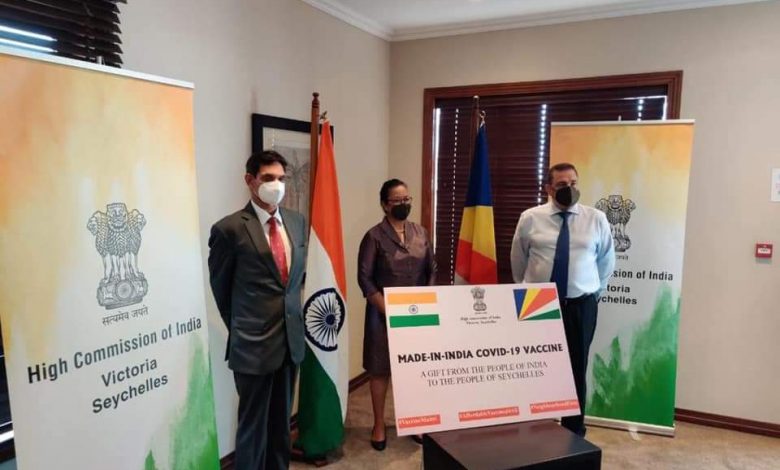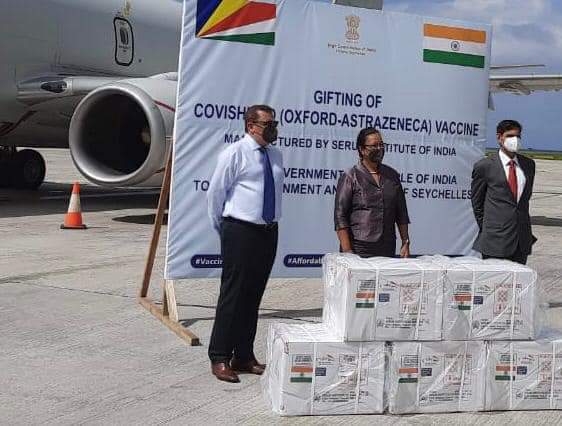
India has gifted the small east African island nation of Seychelles 50,000 doses of the Oxford University approved Oxford-AstraZeneca vaccine on Friday, the 22nd of January. This welcomed gesture is an important one, as so far the Seychelles vaccination campaign has been limited to individuals between the ages 16 to 60 as the current China made SINNOPHARM vaccine available in the country, which was donated by the United Arab Emirates, is not approved for young children and the elderly.
As the number of new COVID-19 cases continues to grow and community transmission is recorded on other islands, the arrival of this new vaccine has given hope to the new administration in reaching it’s goal of having 70% of it’s population vaccinated and achieving herd immunity by mid-year 2021.
As the country is placed under new restrictions in the hopes to slow down the spread of transmission, the Health Commissioner Dr Jude Gedeon had informed the media of the comprehensive vaccination plan which has started over 2 weeks ago, where the newly elected President of Seychelles Mr Wavel Ramkalawan was the first to receive the China made SINNOPHARM vaccine. His vaccination as well as of the previous Head of State President Danny Faure and other government leaders was broadcasted live on television in order to show it’s safety and effectiveness to the public, as many remain skeptical over the new vaccines in the small island nation with a population of just over 90 thousand people.
The Health Commissioner had also previously made clear that “the intended effects of taking the vaccine will only be fully effective after the second dose has been taken”. He expressed that the public must not fall into a false sense of security after taking the first dose, as a person must wait approximately 3 to 6 weeks to receive the second and final dose of the COVID-19 vaccine in order for it to provide effective protection.

The Minster of Health Mrs Peggy Vidot who was present when the vaccines arrived in Seychelles stated that this donation is of huge importance to the country as it allows for another 25,000 more individuals to be inoculated as well as ensure that the elderly are also given protection. Adding that the vaccination program using the newly received vaccine would start as of next week.
It must be noted that as of yet, no pharmaceutical company has been able to develop a safe, effective and reliable vaccine for those aged 16 and younger.
In a small and short ceremony at the Seychelles International Airport, the High Commissioner of India to Seychelles, H.E. Dalbir Singh Suhag presented the 50,000 doses of the Oxford-AstraZeneca vaccine to the Health Minister Mrs. Peggy VIDOT and the Minister of Foreign Affairs Mr Sylvestre RADEGONDE.
Minister RADEGONDE also shared his gratitude to the donation, stating that this kind gesture strengthens the solidarity and friendship of the already close relationship between the Seychelles and India.
The Indian High Commissioner to the Seychelles H.E. Dalbir Singh Suhag briefed those present of the important role India plays in the pharmaceutical industry, specifically in the manufacturing of vaccines. He stated that “60 percent of the global vaccines production is done in India. Every year more than 1.7 billion doses of vaccines are exported from India to more than 150 countries.”
The aircraft that delivered the Oxford-AstraZeneca vaccine on Friday also held vaccines for the Indian Ocean neighbor of Seychelles the island nation of Mauritius which was it’s next destination.
The Seychelles have also been promised an extra 20,000 more doses of vaccines again from The United Arab Emirates, however the public have yet to be informed of exactly which vaccine this would be.




